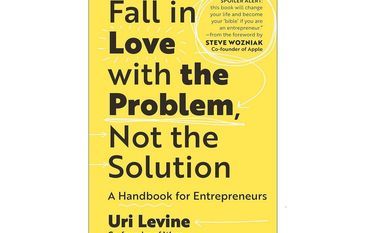Fall in Love with the Problem, Not the Solution: A Handbook for Entrepreneurs
Author: Uri Levine
Publisher: Watkins Publishing
Pages: 327
Price: Rs 699
Uri Levine has excellent credentials to tell entrepreneurs how they should go about doing stuff. He has founded/co-founded or was associated with half a dozen or more startups, at least two of which attained the unicorn status before they were sold. Of these, Waze — the community-driven navigation cum traffic map that Google acquired a decade ago for a billion dollars plus in cash — is the brand that is associated with him most. Google keeps Waze as an independent app, though it competes with Google Maps. But Mr Levine was an investor and board member with another startup — Moovit, a sort of Waze for public transportation — that was sold to Intel, again for a billion dollars-plus. So, he certainly knows what it takes to build a successful startup.
Fall in Love with the Problem, Not the Solution is billed as a handbook for entrepreneurs. That tag is only partially true. Mr Levine’s book is an amalgamation of his entrepreneurial biography, a self-help book for entrepreneurs, and a step-by-step guide for people who want to start up but don’t know how to go about it.
The volume is packed with stories of startups, many of them with which he is or was associated, to illustrate his points. A great many of the stories are about Waze, as can be expected. In fact, it was probably the Waze journey that inspired the title. Mr Levine was holidaying with his extended family in a town called Metula in Israel. When the vacation ended he was going to drive back to Tel Aviv, where he lived. There are only two routes from Metula to Tel Aviv, and both are equally good. Mr Levine wanted to figure out which route would have better traffic but, in 2006, there was no way of doing so.
That led to the Eureka moment. Several other members of his extended family were doing the same road trip in their own cars and most had left before him. They had taken different routes and Mr Levine started calling them up to find out what kind of traffic they were facing.
That led him to come up with the Waze idea — which would use crowd-sourced information to tell people about traffic conditions they were likely to face on any road.
Mr Levine’s advice for budding entrepreneurs is to search for problems and pain points — and then build a business to solve the problem. This is not a no-brainer — almost all startups (except copycats) follow this approach.
A fair amount of the advice Mr Levine gives can also be found in many books for entrepreneurs. In fact, the doyen of management consultants, the late Peter Drucker had advised entrepreneurs to build businesses by solving problems in his book Innovation and Entrepreneurship, published in 1985.
What redeems Mr Levine’s book are the tools and frameworks he gives to help entrepreneurs make decisions. The qualification matrix for example is a simple framework to realistically figure out whether the problem that is being solved has a big enough market. The Fundraising Strategy Flowchart is also useful without being overly complicated. In fact, Mr Levine goes out of his way to keep everything simple. A lot of the stuff he says is not new — but explained well and in a clear and simple fashion.
He is at his best when talking about his own startups. It is when he tries to make his points through other examples that he strikes a false note. For example, the chapter dealing with disruption uses both Gmail and iPhone as examples of how a market with a strong leader was disrupted. However, in both these examples, the explanation is a bit too superficial.
The book is easy to read and broken into short, digestible sections. Mr Levine has had his book endorsed by heavyweights — Steve Wozniak, co-founder of Apple, is generous in his praise, calling it a book that will “change your life and become your Bible.” The assessment of Marc Randolph, co-founder, Netflix is far more accurate. He points out that Mr Levine has one of the rarest of entrepreneurial traits: The skills and persistence to have launched multiple successful companies, paired with the self-awareness to know how he did it.
And that is really the nub of the matter. The book is written in simple language, peppered with interesting examples and some very useful tools and frameworks. It will certainly have utility for entrepreneurs who are struggling with some issues or about to lose hope. But it is unlikely to change anyone’s life or become a Bible for entrepreneurs, as Mr Wozniak says. What often separates a successful entrepreneur is persistence and doggedness to stay focused on the goal, as Mr Randolph has pointed out.
Despite offering a good template to conceptualise a new business — by identifying a problem to solve — this book is not going to make you a successful entrepreneur unless you already have the necessary qualities. If you are already well into your entrepreneurial journey, this book can give you some helpful practical advice.
The writer is former editor of Business Today and Businessworld, and founder of Prosaic View, an editorial consultancy
Unlock 30+ premium stories daily hand-picked by our editors, across devices on browser and app.
Pick your 5 favourite companies, get a daily email with all news updates on them.
Full access to our intuitive epaper - clip, save, share articles from any device; newspaper archives from 2006.
Preferential invites to Business Standard events.
Curated newsletters on markets, personal finance, policy & politics, start-ups, technology, and more.
)